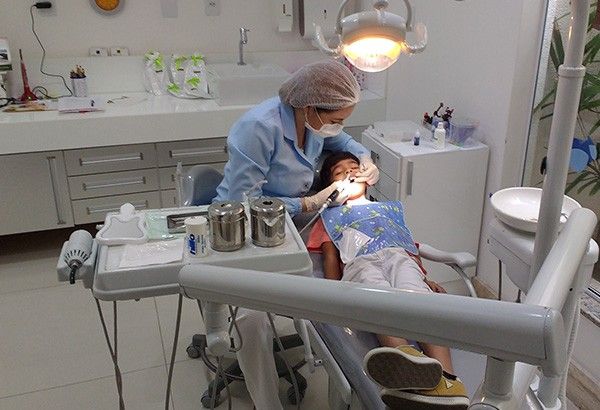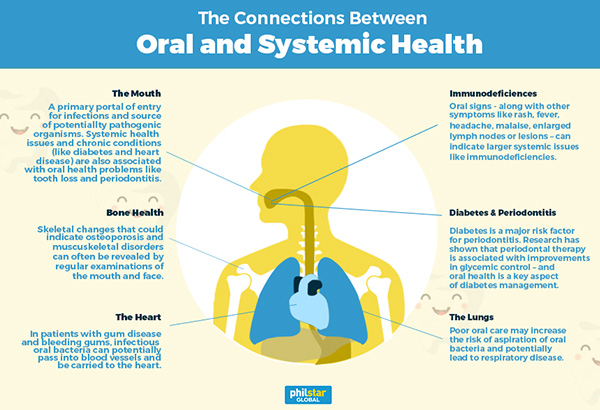Oral Health Month: List of diseases linked to poor oral hygiene

MANILA, Philippines — February is Oral Health Month, but oral health, although important, is one of the most neglected aspects of a person’s overall wellbeing, especially here in the Philippines.
The Global Burden of Disease Study 2016 reported that the country has the most number of children under five years old who are suffering from dental caries throughout Southeast Asia and the Western Pacific region. Dental caries or tooth decay, which is a result of poor oral hygiene, may sound like a simple problem but it’s actually a serious health concern people should not overlook.
Recently, the World Health Organization (WHO) proposed a resolution to reorient oral healthcare’s traditional approach to a preventative approach, with risk identification for timely, comprehensive and inclusive care that ensures healthy living. The resolution underscores that good oral health plays a key role in overall health and wellbeing, and includes an action plan that promotes and integrates disease prevention. It also includes guidance on how WHO Member States, including the Philippines, can integrate oral health within national policies to ensure good oral health for all.
Despite the surge of interest in preventative oral healthcare since the onset of the pandemic, people have been slow to return to the dental chair. A recent survey reported by international technology company Philips showed that 67% of Americans are worried about the negative long-term health consequences of delaying routine dental appointments.
In separate statements sent to Philstar.com, Philips and a top hospital in the Philippines, Makati Medical Center (MakatiMed), shared a list of diseases people could avoid if they observe good oral health. The sources of the following list includes the US Department of Health and Human Services’ “Oral Health in America: A Report of the Surgeon General” (2000); and many scientific studies including “Effects of periodontal disease on glycemic control, complications, and incidence of diabetes mellitus” (2020) and “Periodontitis and cardiovascular diseases: Consensus report” published in Journal of Clinical Periodontology in 2019.
Mouth problems
The mouth is a primary portal of entry for infections and source of potentially pathogenic organisms. Systemic health issues and chronic conditions (like diabetes and heart disease) are also associated with oral health problems, like tooth loss and periodontitis.
According to MakatiMed, poor oral hygiene can lead to tooth decay or early tooth loss which affects the ability to chew food and may lead to poor nutrition. This may also impair speech, which contributes to poor school performance. Dental health issues can also affect a child’s self-confidence and self-esteem. Missing teeth, bad breath, or black stained teeth may make it difficult to develop social relationships.
Immunodeficiencies oral signs
Along with other symptoms like rash, fever, headache, malaise, enlarged lymph nodes or lesions, poor oral health can indicate larger systemic issues like immunodeficiencies.
Diabetes, Periodontitis Diabetes
Poor oral health is a major risk factor for periodontitis. Research has shown that periodontal therapy is associated with improvements in glycemic control – and oral health is a key aspect of diabetes management.
Bone health
Skeletal changes that could indicate osteoporosis and musculoskeletal disorders can often be revealed by regular examinations of the mouth and face.
The heart
In patients with gum disease and bleeding gums, infectious oral bacteria can potentially pass into blood vessels and be carried to the heart. More importantly, poor oral hygiene is also linked to serious health problems like pneumonia and heart disease.
The lungs
Poor oral care may increase the risk of aspiration of oral bacteria and potentially lead to respiratory disease.
Prevention is key
Along with professional deep cleaning, good daily brushing and interdental cleaning are critical. It’s also important for patients to have regular conversations with their dentist about oral health issues and the linkage to their overall health.
“Dental health problems are mostly preventable with proper oral hygiene and regular visits to the dentist. Parents should be the first ones to introduce healthy oral care habits to their children,” advised Dr. Geraldine Campos, Chairperson of the Department of Dental Medicine, MakatiMed.
In time for the National Children’s Dental Health Month this February, Dr. Campos shared some reminders for parents regarding proper oral hygiene for their children:
- Choose the right toothbrush and toothpaste for your child. Make sure that your child’s toothbrush has a small head, soft bristles, and a large handle. It should also be replaced with a new one every 3 months or sooner if the bristles are frayed.
For infants, a soft washcloth or a soft toothbrush can be used by parents to wipe the baby’s gums - even prior to tooth eruption – to establish a daily oral hygiene routine.
Dr. Campos added that children under two years old should use a smear layer size of toothpaste containing no less than 1,000 ppm (parts per million) fluoride, while children 2 years old and above should use a pea size toothpaste with 1,350 to 1,500 ppm of fluoride.
“Make sure that the child brushes his or her teeth twice a day,” Dr. Campos said as she emphasizes the importance of adult supervision until the child can brush his or her own teeth.
- Practice regular flossing. An essential part to the tooth-cleaning process, flossing removes food particles and plaque in between the teeth that brushing is not able to reach.
Dr. Campos said flossing should begin when two teeth start to touch which typically happens when the child reaches the age of 2. Children usually need assistance with flossing until they are 8 to 10 years of age.
To assist in interdental cleaning, the Philips Sonicare AirFloss Pro/Ultra - Interdental cleaner guarantees healthier gums in just two weeks. This unique technology reportedly combines air and mouthwash or water to powerfully yet gently clean between teeth and along the gumline. Interproximal cleaning is very important to overall oral health.
Take your child to the dentist. Dental check-ups every six months are an important part of good oral hygiene for children.
“We highly encourage parents to take their children for a dental check-up after their first birthday or as soon as their first tooth comes out,” Dr. Campos said.
Prevention is always better than cure. Instilling good oral care habits early in your child’s life is the best way to prevent both tooth decay and gum disease.




















